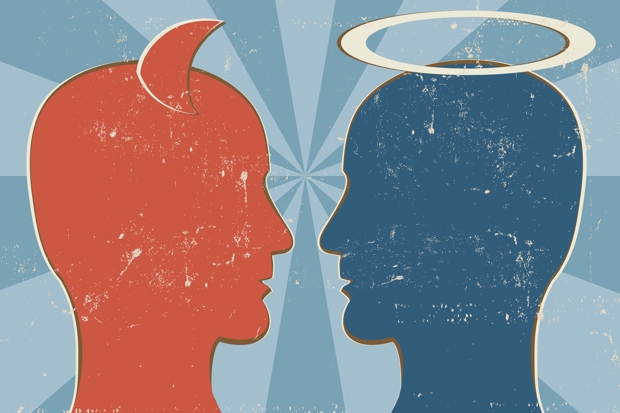I promised to provide, in this space, a forum for thinking about ‘what we believe’. We the West. There are two articles worth noting in the last few days.
Toby Young, right here in The Spectator, wondered how liberal values can be sexed up. Should we hope that potential Islamists will be won over by ‘a crash course in the virtues of limited government and the rule of law, drawing on the writings of John Locke, Immanuel Kant and Thomas Jefferson’? He goes on:
‘Liberalism offers its adherents peace and prosperity – it appeals to man’s desire for comfortable self-preservation, as Nietzsche pointed out. That’s fairly tepid and uninspiring compared to the intoxicating wine of Islamic radicalism, which promises life-and-death struggle, followed by eternal bliss.’
In fact our ideological tradition is a lot bigger than that. It involves the humanist ideal of universal wellbeing, which is perfectly rousing. Later he wonders if liberalism can be re-grounded in Christianity. ‘Even if that was possible, it’s hard to see how it would sit with the anti-clericalism that animates so much of the liberal tradition.’ But there is no real clash between liberalism and religion – rather, the three liberal thinkers he mentions above were deeply sympathetic to liberal Christianity.
In the Telegraph, Charles Moore was similarly philosophical.
‘In our Western politics, there is plenty of common ground about what our civilisation consists in – freedom of speech and religion, the rule of law, parliamentary democracy, accountable institutions, independent universities, habits of tolerance….Where there is a massive difference is about how civilisation can be sustained. This arises from a difference about what where it starts. On the one hand are those who think it rests on universal values, often as proclaimed in written declarations of rights. On the other hand are those who think it arises from history, and is developed by particular people in particular ways at particular times.’
Those on the ‘universalist side’, he goes on, believe that ‘human rights… must be upheld for all people at all times, almost regardless of circumstances.’ Those on the ‘particularist’ side believe that national tradition is primary, and that loyalty to the nation should often trump a theoretical universalism.
The problem with this is that it sums up western ideology in downbeat, pragmatic terms. We all agree on freedom of speech and religion, et cetera et cetera, says Moore. But in reality these are big ambitious ideals, which are logically linked to moral universalism. We do not just think that people of our nation deserve such freedoms – we want to see them extended as widely as possible. He falls into the trap of denigrating universal human rights, because it is potentially in conflict with a proper pride in national tradition. But no such conflict should be acknowledged. We should be proud of our nation’s role in spreading universal morality.
By the way, Moore echoes Samuel Huntington’s argument in The Clash of Civilizations – the West should be wary of moral universalism, he said, because it erodes western pride in its own particular tradition. This is false, for moral universalism is at the heart of the West’s core creed.
Conservative thinkers are liable to misrepresent western values by evading the positive idealism involved – the ideal of universal human flourishing. For they are in the habit of seeing moral universalism as a dubious piece of left-wingery. It is not.







Comments